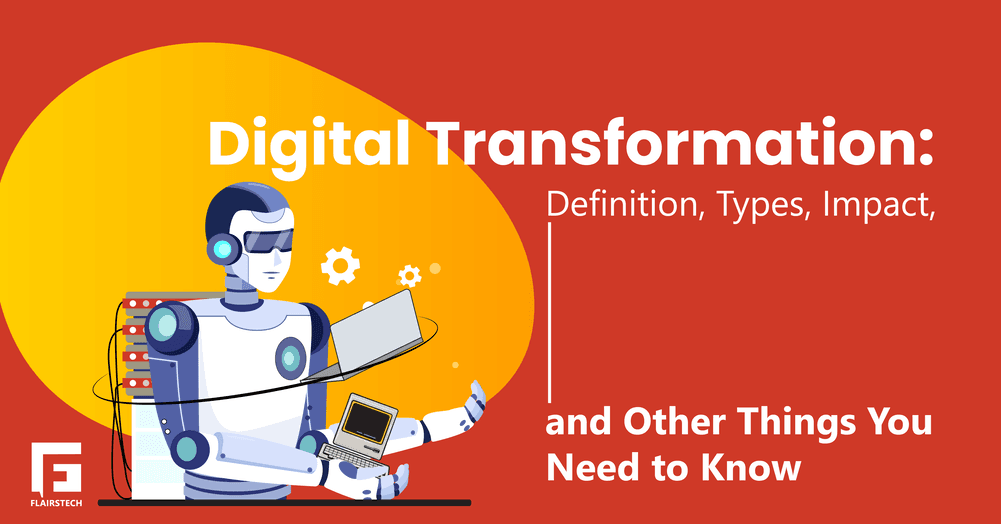- Home
- Digital Transformation
- Digital Transformation: Definition, Types, Impact, and Other Things You Need to Know
Digital Transformation: Definition, Types, Impact, and Other Things You Need to Know

Table of Contents
What is Digital Transformation?
Digital transformation is the integration of digital technology into all areas of a business, fundamentally changing how you operate and deliver value to your customers. Often mistaken for digitalization -the usage of data to simplify how you work; digital transformation is a cultural change in an organization that requires, in some cases, not only reinventing your business systems but also creating entirely new classes within your company. In a PTC report, 60% of companies that have undergone a digital transformation said they created new business models.
In 2018, more than 70% of companies responded to a survey by ZDNet that they either have a digital transformation strategy in place or are working on one. Digital transformation is an investment, often large in scale, that is all about understanding what your technology is capable of. Rather than looking at how much faster can your organization perform with digital transformation, aim for making the most out of this new technology by adapting fresh and current business processes to it.
Types of Digital Transformation:
While there are many objectives of digital transformation, the process can still be summed up in four main types.
1. Process Transformation·
2. Business Model Transformation·
3. Domain Transformation·
4. Cultural/Organizational Transformation.
Why Do You Need Digital Transformation?
The answer to this question lies in what digital transformation can offer your company. 56% of CEOs say digital improvements have led to increased revenue; however, profit is only one of the many ways you can benefit from a digital technology business model.
The integration of computer-based technologies can be more visible in some areas than others, yet, at length, it allows companies to better serve their principal stakeholders: customers, employees, partners, and shareholders.
From sales and marketing to finance, by consolidating information, sensitive data, and resources into one suite, digital transformation significantly improves a company’s resource management.
Moreover, improving operational efficiency (40%), allowing faster time to market (36%), and meeting customer expectations (35%) were some of the top benefits shared by business leaders with digitally-transformed enterprises.
Why is Digital Transformation Important?
As technologies constantly evolve, an easier life (customer experience) has become every business’s aim. It’s believed that customers will gradually and infinitely leave behind businesses that don’t operate online –both customer service and ecommerce- and across channels. 27% of companies and a third of enterprise leaders are worried their organizations will not survive in the upcoming years without digital transformation.
In the recent COVID-19 pandemic, organizations across nearly all industries were forced to abandon or, at most, limit in-person interactions –inbound and outbound- from customers to employees, partners, and suppliers. Having to virtualize most business processes, the adaptation of advanced technologies accelerated. This year, IDC predicts that 53% of all investments in information and communication technology will be in digital transformation.
Digital Transformation World Trends:
The top digital transformation trends to help future-proof your business model in 2023 include change management, hybrid work, growing cloud migration, and the use of advanced technology like Artificial Intelligence (AI) and Machine Learning, Customer Data Platforms (CDPs), DevOps, and ITSM platforms.
Where Do You Start?
Start by identifying the three layers of a successful digital transformation within your organization. A successful digital transformation model is three-layered, starting with data gathering, processing this data, and ending with the delivery and application of the information gathered in the form of a technological business model.
According to Forbes, 84% of digital transformation projects fail due to an unidirectional approach to driving such projects and not focusing on all three layers of digital transformation.
If digital transformation is on your mind, you can always book a free consultation with one of our digital transformation experts to discuss your company’s needs and explore possible approaches.
Written by:
- Amr Fahmy | Senior Copywriter
I use 8 years of content excellence experience to ensure everything you read is accurate, backed by real industry data and insights.


